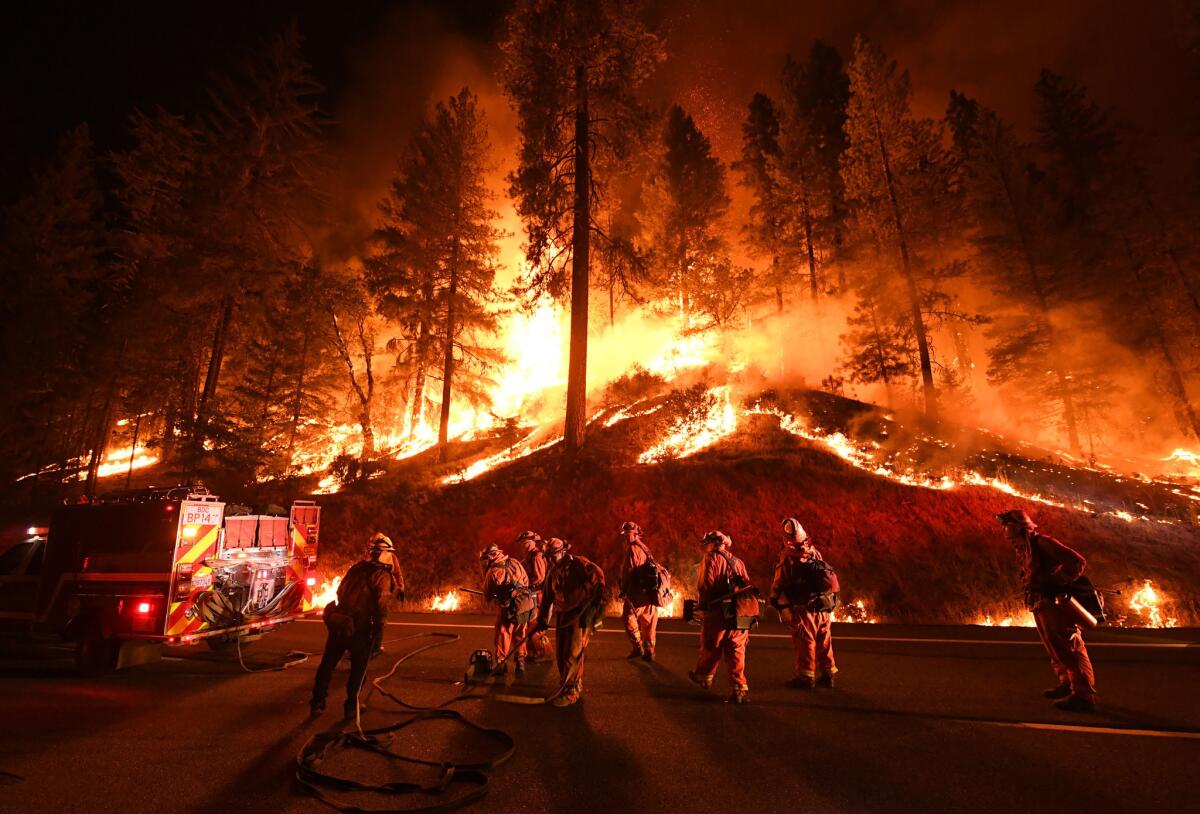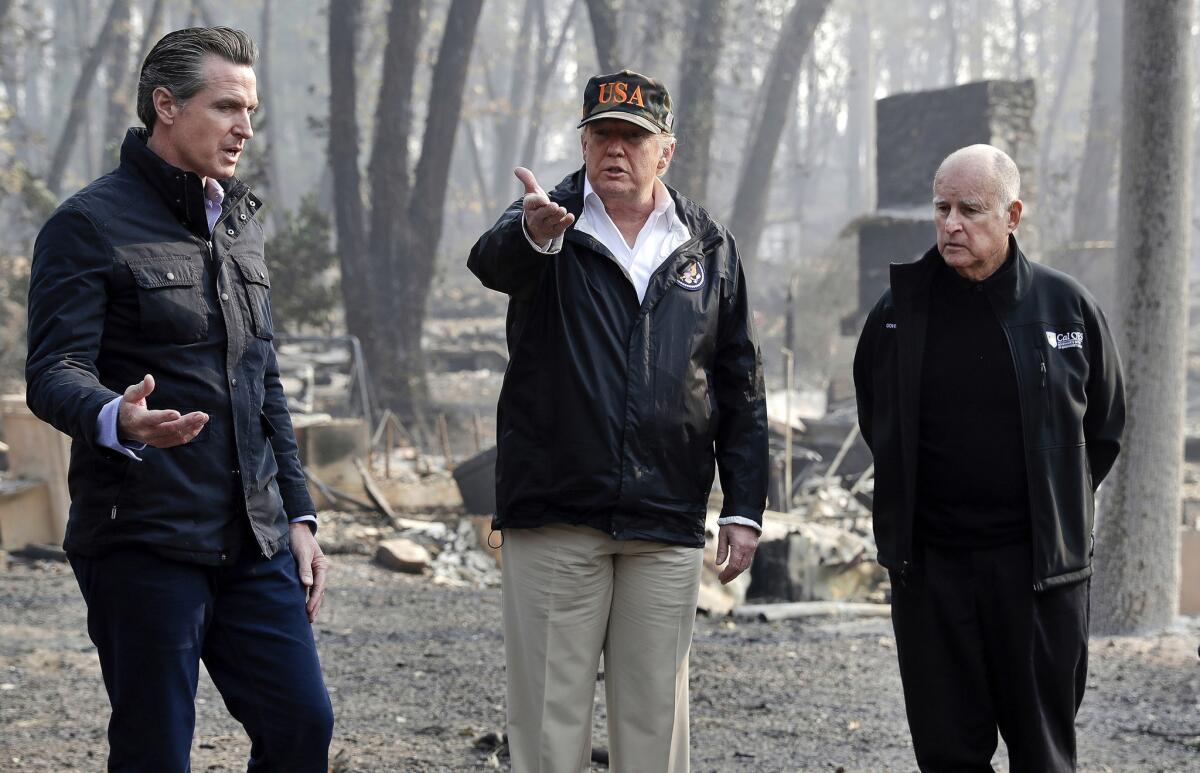Trump opens new war with California over wildfires, seeking to slash payments for firefighting on federal land

- Share via
The relationship between President Trump and California has long been fraught, but in the aftermath of the state’s deadliest wildfire season, the acrimony is burning hotter than ever.
In November, as crews battled the Camp and Woolsey fires, Trump blamed the state for “gross mismanagement of the forests” and delivered this ultimatum: “Remedy now, or no more Fed payments!”
Then, while visiting the devastated town of Paradise later that month, Trump suggested California could eliminate the threat of wildfire by “raking.”
Now, the Trump administration has taken matters a step further.
As California prepares for what some officials fear will be another devastating fire season, the U.S. Department of Agriculture and U.S. Forest Service are withholding reimbursements that state fire agencies say are owed for battling wildfires on federal lands last year.
Instead of fulfilling California’s full $72-million reimbursement request, the Forest Service conducted an audit of the California Fire Assistance Agreement and now accuses the state of overbilling.
The Forest Service has demanded that the state provide proof of its “actual expenses.”
With the start of the traditional fire season just weeks away, California officials worry that the audit is a precursor to the Trump administration cutting back on fire assistance.
In a May 14 letter to Agriculture Secretary Sonny Perdue and Forest Service Chief Vicki Christiansen, Sen. Dianne Feinstein implored them to delay any actions that would reduce reimbursement rates.
“As you know, around 60% of forested land in California is owned by the federal government,” Feinstein wrote. “Wildfires don’t stop at jurisdictional boundaries, so a unified federal-state approach is the only way to properly protect lives and property.”

The dispute marks a sudden change in a decades-long partnership between federal and local authorities.
Since 1961, the Forest Service has reimbursed the Governor’s Office of Emergency Services, or Cal OES, for the costs of local, state and volunteer firefighters who help battle blazes on federal lands.
Under the current assistance agreement, which runs from 2015 to 2020, the state calculates those costs by averaging the salaries, benefits and other indirect expenses tied to the work of firefighters, according to Cal OES Fire Chief Brian Marshall.
For the 2018 fire season, which killed at least 100 people, Cal OES calculated total reimbursements of $72 million. That estimate included the work of some of the 5,600 firefighters who battled the Camp fire as it spread into Plumas National Forest in November, and 3,400 firefighters who battled the Carr fire in Shasta-Trinity National Forest in July.
The Forest Service said in a statement that it decided to audit the agreement after receiving a letter from Cal OES Director Mark Ghilarducci. That letter, which was sent in July 2017, chastised the agency for not reimbursing the state in a timely manner.
“The USFS has blatantly ignored its financial responsibility to the men and women of California who have risked their lives fighting fires to protect federal land,” Ghilarducci wrote.
As a result of the audit, the federal government is now withholding more than $9 million of the original $72 million reimbursement request. Some of that money, according to the California Department of Forestry and Fire Protection, or Cal Fire, is reportedly owed to the Los Angeles County Fire Department.
“The audit found that the current [California Fire Assistance Agreement] does not result in reimbursement of actual expenses to local fire departments,” the Forest Service said in a statement provided to The Times.
“Our intentions are to fully reimburse the State of California for all of their actual expenses. The only payments that we have not made are those that do not have documentation that substantiate actual expenses,” the Forest Service said.
Cal OES argues that the federal government is changing the terms of its agreement unfairly.
Fire Chief Marshall said it has been a long-accepted practice for the state to submit average personnel costs, and that tabulating the actual salary, overtime, travel costs and other expenses for thousands of individual firefighters on every federal incident would be too onerous and time-consuming.
“The new requirements the USFS seeks to impose would be cumbersome and would severely impact California’s ability to respond to fires,” Marshall wrote in a letter to the agency.
He also said the federal government is withholding the audit itself, and that he and other officials were only briefed on portions of it.
“It wasn’t a typical audit that you see from the government. It was a PowerPoint; it wasn’t an audit. They said ‘overcharging.’ But they also said ‘undercharging,’” Marshall said. “They won’t tell us if they’re going to be able to pay our volunteers or not.”
While large fire departments like L.A. County’s may be able to absorb the financial hit, those with only a few employees, or those that run exclusively on volunteers, can’t, Marshall said.
“If a fire department is unable to send resources and personnel to a fire because they don’t know if they’re going to get paid, then obviously the fires are going to get bigger, and that’s unacceptable.”
California has long served as a model for large-scale disaster response, although its history of preparation has left something to be desired.
After the Oakland Hills fire in 1991, California set up a framework for responding, communicating and allocating resources across multiple jurisdictions and levels of government during an unfolding disaster. That became the outline for a national model following the Sept. 11, 2001, terrorist attacks.
Similarly, California’s current approach to mutual aid among fire agencies is “viewed and cited as the nation’s most effective model,” Marshall wrote to the Forest Service on April 24. “To date, the USFS provided no legal citation for these requirements, nor any basis for the need to deviate from past interpretation and implementation of the CFAA.”
For its part, the Forest Service said it’s only looking out for the American taxpayer.
“We are working diligently with the State of California to obtain the information needed to expedite full reimbursement of the State’s incurred expenses,” the agency’s statement said.
More to Read
Sign up for Essential California
The most important California stories and recommendations in your inbox every morning.
You may occasionally receive promotional content from the Los Angeles Times.














